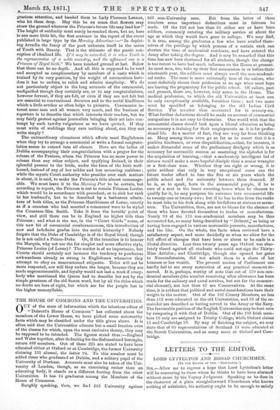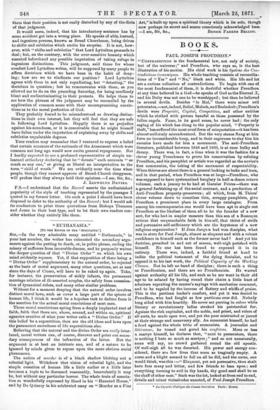LETTERS TO THE EDITOR.
LORD LYTTELTON AND BROAD CHURCHMEN.
[TO THE EDITOR Of THE SPECTATOR.")
SIR,—Allow me to express a hope that Lord Lyttelton's letter will be reassuring to those whom he thinks to have been alarmed without cause by the Voysey Judgment. Speaking as he does in the character of a plain straightforward Churchman who knows nothing of subtleties, his authority ought to be enough to satisfy them that their position is not really disturbed by any of the dicta of that judgment.
It would seem, indeed, that his introductory sentence has by some accident got into a wrong place. He speaks of able, learned, and ingenious persons, known as Broad Churchmen, being driven to shifts and subtleties which excite his surprise. It is not, how- ever, with " shifts and subtleties " that Lord Lyttelton proceeds to deal ; but, on the contrary, with the over-sensitive honesty which resented beforehand any possible imputation of taking refuge in ingenious distinctions. This judgment, said those for whose comfort Lord Lyttelton writes, will be supposed by many people to affirm doctrines• which we have been in the habit of deny- ing; how are we to vindicate our position? Lord Lyttelton agrees with them in not only repudiating, but "detesting," the doctrines in question ; but he remonstrates with them, as you allowed me to do on the preceding Saturday, for being needlessly blunt and undiscriminating in their protests. He helps them to see how the phrases of the judgment may be reconciled by the application of common sense with their uncompromising convic- tions as to the moral perfection of God.
They probably feared to be misunderstood as drawing distinc- tions in their own interest, but they will feel that they are safe in following Lord Lyttelton. Happily there is no prejudice against his soundness, or it is conceivable that he might himself have fallen under the imputation of explaining away by shifts and subtleties unpalatable dogmas.
Your readers may remember that I ventured to express a belief that certain accounts of the rationale of the Atonement which were common not long ago would now excite general repugnance. But I hardly expected to see a professed representative of simple un- learned orthodoxy declaring that he " detests " such accounts " as much as any one," or giving so liberal an interpretation to the term " child of wrath." We are evidently near the time when people, though they cannot approve of Broad-Church clergymen, will profess that they always held their opinions.—I am, Sir, &c., J. LLEWELYN DAVIES. P.S.—I understand that the Record asserts the undiminished popularity of the style of teaching represented by the passages I quoted in my former letter. On such a point I should have been disposed to defer to the authority of the Record; but I would ask its conductors to print those quotations from Bishops Thomson and Jenne in their best type, and to let their own readers con- sider whether they entirely like them.



































 Previous page
Previous page